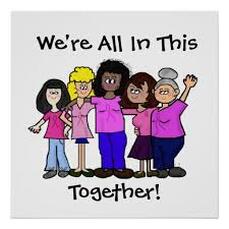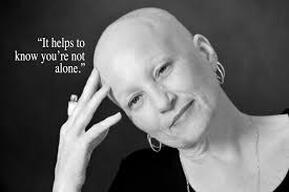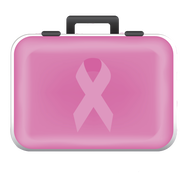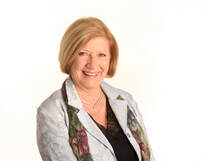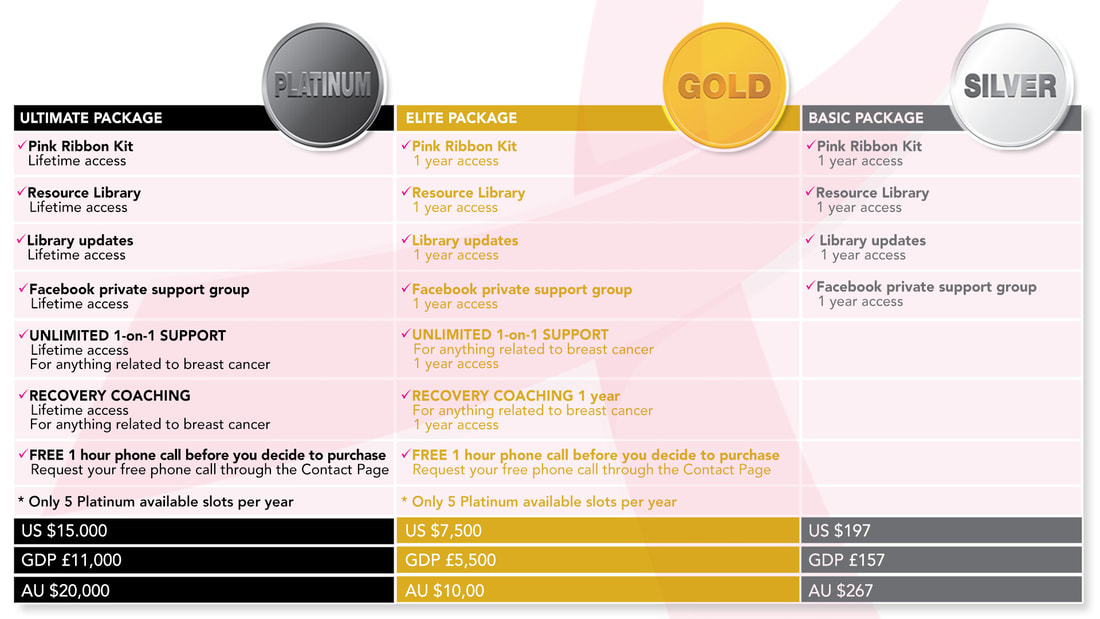Confidential Support
Mastectomy patients need a great deal more support than ladies who
only have a lumpectomy...even if they undergo breast reconstruction
The extent to which a person with cancer has support has been identified as a major factor in their coping with the disease
(NBCC & NCCI, 2005)
(NBCC & NCCI, 2005)
Let's talk about your support options...
- Just relying on your busy medical team
- Leaning on family members (who often don't know what to say or do to help you)
- Going it alone and 'toughing it out'
- Joining a local cancer support group
- Being part of an international online dedicated breast cancer group
- One-on-one support with someone who understands the challenges of your breast cancer journey.
Keep reading to work out what will suit you from today...
to travel your breast cancer journey and make a faster recovery.
Understanding your treatment plan + information + support will reduce your stress levels as well as emotional and physical pain!
If you have had mastectomy surgery, one breast or a double mastectomy, with or without breast reconstruction you need a great deal more support than a simple lumpectomy.
You also need appropriate information and support to regain your confidence in ALL areas of life…
that includes physical, emotional, relationship and sexual recovery.
About half the women with breast cancer are single...or their partner is unable or unwilling to support them.
Whatever treatment options you choose they need to be supported without judgement, but make sure that you have a good understanding of the treatment plan. You may also want to explore alternative and complimentary medicine.
You also need appropriate information and support to regain your confidence in ALL areas of life…
that includes physical, emotional, relationship and sexual recovery.
About half the women with breast cancer are single...or their partner is unable or unwilling to support them.
Whatever treatment options you choose they need to be supported without judgement, but make sure that you have a good understanding of the treatment plan. You may also want to explore alternative and complimentary medicine.
Practical solutions and strategies to tap into at any time of the day or night are also vital.
However, at points along your journey either a local group, online group or one-on-one support will really help you to heal and process
what is possibly one of the most traumatic times in your life.
Cancer support groups can be a great source of emotional support while you are on the treatment path, but they need to be chosen carefully.
Some people do not enjoy any type of support group for various reasons. In fact only 5% of cancer patients attend a group. That means that
far too many patients (and those who care for them) are struggling alone in uncharted waters for them.
The mix of ages and cultures may not work for you.
Sometimes the groups don’t always run at times or locations that suit you.
If members are negative or dying it can be confronting…and not what you want to handle.
Groups tend to include all types of cancer with different needs and treatments. Try to find a specific breast cancer group.
You may not want to ‘unload’ your concerns and issues onto local people who you could meet in the shopping centre, at church, friends of friends
or even at work.
Most people don’t want to make their cancer journey a topic of conversation or object of pity….and when it’s over they want everyone to stop thinking
of you as a cancer victim.
Groups have criteria for joining. They may not let you start until you are over the initial diagnosis shock as you may need more time to talk than other
group members. Once your treatment is finished you may be expected to leave to make room for new members.
Enlightened health professionals know that breast cancer patients often experience the 'long shadow' of cancer after you have been told to "get on with your life". Generally speaking, you need support to continue for as long as your treatment journey plus a few months afterwards.
You have been through a cancer 'war zone'. It's not uncommon for ladies to suffer a form of post traumatic stress for a while. That's why some patients can't understand why they feel depressed instead of feeling free of the treatments and able to go on with life normally. With time and understanding support you can come out of this 'long shadow' of breast cancer.
If your doctors have not given you hope for a good recovery, then you and your loved ones will definitely need long-term compassionate support with someone experienced in palliative care.
This is not the time to “go it alone”. Research shows you will do much better with information and support.
However, at points along your journey either a local group, online group or one-on-one support will really help you to heal and process
what is possibly one of the most traumatic times in your life.
Cancer support groups can be a great source of emotional support while you are on the treatment path, but they need to be chosen carefully.
Some people do not enjoy any type of support group for various reasons. In fact only 5% of cancer patients attend a group. That means that
far too many patients (and those who care for them) are struggling alone in uncharted waters for them.
The mix of ages and cultures may not work for you.
Sometimes the groups don’t always run at times or locations that suit you.
If members are negative or dying it can be confronting…and not what you want to handle.
Groups tend to include all types of cancer with different needs and treatments. Try to find a specific breast cancer group.
You may not want to ‘unload’ your concerns and issues onto local people who you could meet in the shopping centre, at church, friends of friends
or even at work.
Most people don’t want to make their cancer journey a topic of conversation or object of pity….and when it’s over they want everyone to stop thinking
of you as a cancer victim.
Groups have criteria for joining. They may not let you start until you are over the initial diagnosis shock as you may need more time to talk than other
group members. Once your treatment is finished you may be expected to leave to make room for new members.
Enlightened health professionals know that breast cancer patients often experience the 'long shadow' of cancer after you have been told to "get on with your life". Generally speaking, you need support to continue for as long as your treatment journey plus a few months afterwards.
You have been through a cancer 'war zone'. It's not uncommon for ladies to suffer a form of post traumatic stress for a while. That's why some patients can't understand why they feel depressed instead of feeling free of the treatments and able to go on with life normally. With time and understanding support you can come out of this 'long shadow' of breast cancer.
If your doctors have not given you hope for a good recovery, then you and your loved ones will definitely need long-term compassionate support with someone experienced in palliative care.
This is not the time to “go it alone”. Research shows you will do much better with information and support.
The trend now is that more and more ladies (and loved ones) are choosing a one-on-one support person that they can trust to ‘be there for them’ for as long as they need.
That is backed up by research (Helgeson et al, 2000).
Someone who has long experience in the breast cancer arena and all the associated challenges would be safer than just a 'survivor' who is running a local group.
Trish Duke, founder of the Mastectomy Recovery Centre says...
"Over my 40 years of clinical experience I saw a huge need for a ‘one stop’ library to get information and support to cancer patients who were either living in ignorance or stressing out going all over the internet looking for information. Because of their lack of medical knowledge it was a frightening, bewildering search that often lead to more stress and fear.
I personally spent a great deal of time and money developing our multi-media Resource Library packing it with comprehensive information you can access 24/7 for the rest of your life. International health professionals and breast cancer survivors have contributed their experience through videos, radio interviews, articles, audio"
That is backed up by research (Helgeson et al, 2000).
Someone who has long experience in the breast cancer arena and all the associated challenges would be safer than just a 'survivor' who is running a local group.
Trish Duke, founder of the Mastectomy Recovery Centre says...
"Over my 40 years of clinical experience I saw a huge need for a ‘one stop’ library to get information and support to cancer patients who were either living in ignorance or stressing out going all over the internet looking for information. Because of their lack of medical knowledge it was a frightening, bewildering search that often lead to more stress and fear.
I personally spent a great deal of time and money developing our multi-media Resource Library packing it with comprehensive information you can access 24/7 for the rest of your life. International health professionals and breast cancer survivors have contributed their experience through videos, radio interviews, articles, audio"
Trish developed the int'l Resource Library and private Facebook breast cancer support group , with an option for one-on-one personal support.
It's called the Pink Ribbon Kit.
You have lifetime access for you as a patient and the loved ones that you invite to the FB group or to use the Library.
You will be see posts about updates in the Library and be able suggest new content.
CLICK HERE to check out the contents of the Library
or
CLICK HERE here to gain access to the Pink Ribbon Kit
The Facebook group means you learn from and relate to ladies from other countries. 24/7 you can compare notes on treatments, challenges and progress... as well as making new friends who 'get you' !
The Mastectomy Recovery Centre has a Christian foundation, so the FB group members can request or give prayer.
This is not the time to 'go it alone' and be an independent woman!
Trish developed the int'l Resource Library and private Facebook breast cancer support group , with an option for one-on-one personal support.
It's called the Pink Ribbon Kit.
You have lifetime access for you as a patient and the loved ones that you invite to the FB group or to use the Library.
You will be see posts about updates in the Library and be able suggest new content.
CLICK HERE to check out the contents of the Library
or
CLICK HERE here to gain access to the Pink Ribbon Kit
The Facebook group means you learn from and relate to ladies from other countries. 24/7 you can compare notes on treatments, challenges and progress... as well as making new friends who 'get you' !
The Mastectomy Recovery Centre has a Christian foundation, so the FB group members can request or give prayer.
This is not the time to 'go it alone' and be an independent woman!
If you choose the option of ‘one-on-one’, Trish Duke is your key support person and recovery coach who can communicate with you weekly
by email, WhatsApp, Skype, phone, Messenger etc.
Trish has been a qualified cancer support group facilitator for many years and treated breast cancer patients over four decades as a physiotherapist. (About)
This option has limited places to ensure adequate care and time for each person.
Applicants for 'one-on-one' support are accepted only after a chat with Trish to make sure that it's a right fit for you.
Contact Trish through the contact form to request a phone call to discuss the opportunity to take one of the five one-on-one slots available per year.
The About page shows her experience in helping people just like you.
She says...
What we can’t offer you is treatment advice, but can help you to ask your medical team the right questions.
Remember ...Understanding your treatment plan + information + support will reduce your stress levels as well as emotional and physical pain!!
CLICK HERE to view a summary of the contents of the Library
OR
CLICK HERE to gain access to the Pink Ribbon Kit
There are more options for you to consider below....
by email, WhatsApp, Skype, phone, Messenger etc.
Trish has been a qualified cancer support group facilitator for many years and treated breast cancer patients over four decades as a physiotherapist. (About)
This option has limited places to ensure adequate care and time for each person.
Applicants for 'one-on-one' support are accepted only after a chat with Trish to make sure that it's a right fit for you.
Contact Trish through the contact form to request a phone call to discuss the opportunity to take one of the five one-on-one slots available per year.
The About page shows her experience in helping people just like you.
She says...
- I will listen to you without judgement
- Confidentiality is vital
- I will be there for you throughout the entire breast cancer journey
- Motivate and encourage you to make the best recovery possible...physically, emotionally, sexually.
- Help you to find the answers you need
- I will be open and honest with you
- If you would like prayer, I can pray with and for you
What we can’t offer you is treatment advice, but can help you to ask your medical team the right questions.
Remember ...Understanding your treatment plan + information + support will reduce your stress levels as well as emotional and physical pain!!
CLICK HERE to view a summary of the contents of the Library
OR
CLICK HERE to gain access to the Pink Ribbon Kit
There are more options for you to consider below....
